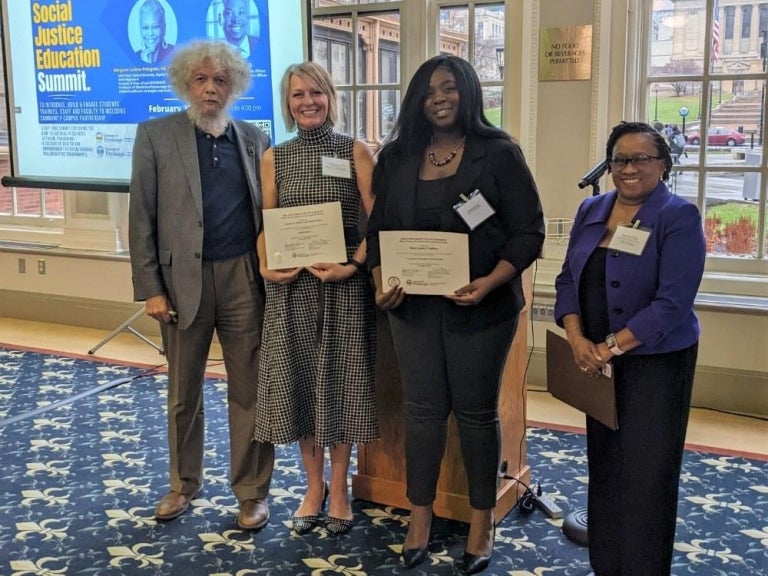
Receiving certificates at the Social Justice Fellowship commencement, pictured left to right: Noble A-W Maseru, director, Social Justice, Racial Equity and Faculty Engagement in the Health Sciences; Jennifer White, assistant professor, Department of Occupational Therapy; Toksie Goncalves; and Paula K. Davis, associate vice chancellor, Health Sciences Diversity, Equity and Inclusion
Jennifer S. White, assistant professor in the Department of Occupational Therapy (OT), is one of five Health Sciences faculty who recently completed the inaugural Social Justice Faculty Fellowship program developed by the Office of Health Sciences Diversity, Equity and Inclusion. The fellowship pairs one faculty member from each of the Pitt Health Sciences schools with a community organization for a 10-month project to address inequities relative to the health and well-being of the community-at-large.
White’s extensive experience as a clinician and an innovative leader in SHRS made her a natural fit to participate in the fellowship program. Her expertise is in the development and implementation of Justice, Equity, Diversity and Inclusion (JEDI) concepts in the classroom as well as for OT faculty and staff. White explains that she is motivated and committed to social justice and equity for multiple reasons. “Most predominantly as a clinician,” she continues, “I personally witnessed discrimination and inequality in and outside of health care and have a sense of moral obligation to contribute to a more just and equitable society. I also have a deep concern for the health and well-being of marginalized and oppressed individuals and communities, and I understand that as an educator, I contribute to our future practitioners’ ability to reduce health disparities for vulnerable populations.”
For her fellowship, White worked with the Pittsburgh Black Equity Coalition (BEC) and the East Liberty Family Health Care Center (ELFHCC) to create a short, animated video to explain Social Determinants of Health (SDoH) to community members who use services at the center. The video will play in the center’s lobby so it can be viewed as people wait for their appointments.
Finding a Solution to a Community Need
At the beginning of the project, White and her community partners, Ayanna King of BEC and Toksie Goncalves from Primary Care Health Services (PCHS), recognized that “many people do not understand SDoH and the impact they can have on the health and well-being of communities.” They brainstormed the idea of communicating the messaging of SDoH through an animated video, which is an engaging tool that White has used successfully in her classroom. She says that in her experience, the video medium has had the ability to “significantly enhance authenticity in diverse representation of people in my courses, which even the best paper-based/written cases cannot offer.”
White and King partnered with a local graphic artist, Thea Ozaeta, to create the animated project, which including writing a script based on community feedback, and providing Ozaeta with pictures and voice recordings of the people who would serve as characters in the video. Originally, they wanted ELFHCC health care providers to portray the animated characters to create a connection between the providers and their community, but time restraints turned the fellowship partners into stars as King, Goncalves, White and their mentor Channing Moreland were transformed into colorful, informative animated form.

White and Goncalves presenting their final project at the Social Justice Fellowship commencement
Impactful Change to Health Inequities
The response from leadership at Primary Care Health Services and the community has been excellent and has the potential for far-reaching impact. White says, “Dr. Jerome Gloster, CEO/CMO for PCHS, reported back that he enjoyed it and would like a version of it for rural areas. The BEC is hoping to add it to a toolbox they have and would like to share it with community members across the state of Pennsylvania. We also created posters and will be distributing them to multiple health centers locally.”
White’s dedication to improving the balance of health inequities and teaching the next generation of health care providers at SHRS has only been solidified from the fellowship. “I believe as educators who are preparing the next generation of practitioners, it is imperative that we focus our efforts in ensuring just, equitable, diverse and inclusive health care for all people. We can achieve this in two ways:
- Start by making sure we all understand SDoH and the impact they have on people’s participation in their occupations and how that contributes to poor health outcomes in our community, and
- SDoH need to be infused into course content and must be included in strategic plans for the university, SHRS and all departments.”

2021 - 2022 Social Justice Faculty Fellowship Commencement
Upon completing her fellowship, White reflects, “It was truly a pleasure to be a part of the Social Justice Fellowship and I encourage everyone in SHRS to consider applying when applications open again. I was able to make connections with community members that I otherwise would not have had the opportunity to meet and feel like we will help improve the health of communities across Pennsylvania by connecting people with available resources to improve their health and well-being.”
---
Published March 20, 2023
Updated March 29, 2023
